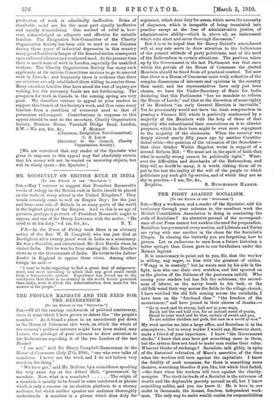THE PEOPLE'S MANDATE AND THE NEED FOR THE REFERENDUM.
(To THE EDITOR OP THE " SPECTATOR."]
SIR,—Of all the canting catchwords of political controversy, there is none which I have grown to detest like "the people's mandate." As it found a place in an amendment put down in the House of Commons this week, on which the whole of the country's political interests might have been staked, may I crave the privilege of your columns to draw attention to the declarations regarding it of the two Leaders of the last House P "I am not," said Sir Henry Campbell-Bannerman in the House of Commons (July 27th, 1906), "one who ever talks of mandates. I never use the word, and I do not believe very much in the thing." " We have got," said Mr. Balfour, by a coincidence speaking the very same day at the Albert Hall, "government by mandate. Now, what is a mandate ? The origin of a mandate is usually to be found in some catchword or phrase which is only a success on an election platform to a stormy audience, but which neither speaker nor audience thoroughly understands. A mandate is a phrase which does duty for
argument, which does duty for sense, which saves the necessity of eloquence, which is incapable of being translated into practice except at the loss of administrative justice, of administrative ability—which is, above all, an instrument which cuts short and saves thorough discussion."
But it is to be hoped that Sir Henry Dalziel's amendment will at any rate serve to draw attention to the hollowness of the present attitude of party politicians, and of the need of the Referendum in certain situations. The position taken up by the Government in the last Parliament was that once within the portals of the House of Commons the elected Members should be freed from all practical control. Yet now that there is a House of Commons more truly reflective of the complex dissensions of interests and opinions in the country than usual, and the representatives have only just been chosen, we have the Under-Secretary of State for India declaring that this Parliament "has no mandate to reform the House of Lords," and that at the discretion of some eighty of its Members "an early General Election is inevitable." Yet he presumably would not have the least compunction in passing a Finance Bill which is positively condemned by a majority of the Members with the help of those of that majority who subordinated their convictions on it to ulterior purposes, which in their turn might be even more repugnant to the majority of the electorate. When the country was deeply _stirred nearly fifty years ago by another Constitu- tional crisis—the question of the extension of the franchise— that clear thinker Walter Bagehot wrote in support of a second Reform Bill: " We must act in the spirit of faith that what is morally wrong cannot be politically right." What- ever the difficulties and drawbacks of the Referendum, and they will no doubt be many, it is worth risking them all to put to the test the reality of the will of the people to which politicians pay such glib lip-service, and of which they are so shy in practice.—I am, Sir, &c., Brighton. S. HUTCHINSON HARRIS.














































 Previous page
Previous page